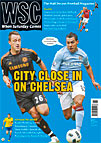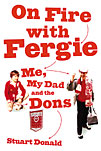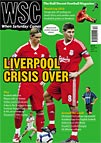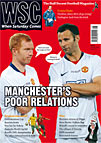 Dear WSC
Dear WSC
Congratulations on the article about match-fixing (Crimes and misdemeanours, WSC 283). Paul Joyce did a superb job reviewing the many different cases of corruption in European football. As the German police investigation began, partly because of the controversy around my book, The Fix, I did want to take him up on one issue. He mentioned that “Germany lies second in the match-fixing table” – this is true but it is not because corruption is more prevalent in German football. Rather it is because the German authorities are now, after years of denial, actually taking the issue seriously and are vigorously investigating match-fixing – and the more they investigate, the more they find. This proactive attitude is in stark contrast with British football authorities who seem to have adopted the attitude of “don’t know, don’t want to find out”. The circumstances in British football are similar to other European countries: thousands of relatively badly paid players; lots of poor clubs and lots of interest in the gambling markets. However, the British authorities have not yet fully woken to the dangers. I can only hope that they do before they discover a similar problem to the one in Europe.
Declan Hill, Oxford
Search: ' Keith Hill'
Stories
 Me, My Dad And The Dons
Me, My Dad And The Dons
by Stuart Donald
Hachette Scotland, £ 12.99
Reviewed by Keith Davidson
From WSC 284 October 2010
Despite the title, this book has nothing to do with Sir Alex Ferguson and his time at Pittodrie. Instead it's a memoir by Stuart Donald, looking back on his childhood as a Perth-based Aberdeen fan in the late 1970s and 1980s, and how his relationship with his father developed while they watched the Dons together during the club's most successful era.
 Dear WSC
Dear WSC
I read with interest Paul Joyce’s article concerning the rebranding of SSV Markranstadt as RB Leipzig in WSC 273. Only this summer it was rumoured that my club Southampton would be saved from extinction by becoming co-opted into the Red Bull sporting portfolio. While the team colours, fitting snugly with the brand, would not need to change the adding of the Red Bull moniker seemed a step too far. Surely something would be lost in fusing a global brand, with all its focus-grouped values and marketing spin, to a football club; an act of historic vandalism similar to replacing stained glass windows in a church with double glazing while nailing a satellite dish to the spire. The internet debate suggested, however, that many Saints supporters were happy to trade naming rights in exchange for the club’s survival. The same supporters had several years previously reacted angrily against a corporate branding of St Mary’s Stadium as simply the “Friends Provident Stadium” with the ensuing negative publicity resulting in a U-turn with the addition of St Mary’s to the title. Corporate patronage is not as new as we would like to imagine. The P in PSV Eindhoven stands for Philips, as in the Dutch electrical giants, with the club’s home games at the Philips Stadion. Indeed, many clubs have benefited from long-term relationships with business which may be far preferable to other ownership and financing options; a quick glance around the leagues reveals several fates far worse than “Red Bull Saints”. Football may be just a game to some but following our team is about being part of a community, feeling a connection with the friends and strangers stood next to us at the ground. It is a thread linking us to people looking out for the score on a TV screen or in a newspaper on the other side of the world. Brands by their nature seek to harness and transform these feelings to translate them into profit, in the process sullying the very spirit of our club. Barcelona’s motto is “more than a club”. Every clubs motto should be “more than a brand”.
Neil Cotton, Southampton
 Non-League teams are increasingly from suburbia. So the visit of a steelworks team to a colliery town is an unusual event in one of the country's oldest competitions, the Northern League. Harry Pearson reports
Non-League teams are increasingly from suburbia. So the visit of a steelworks team to a colliery town is an unusual event in one of the country's oldest competitions, the Northern League. Harry Pearson reports
Saturday afternoon in the north-east and its raining. It’s not a heavy rain. It’s the sort of fine rain that hangs in the air, all-enveloping like an unfinished argument. The bus from Peterlee to Horden drops me off at a stop next to a Spiritualist church. Down the road towards the porridge-coloured North Sea there’s a medical centre named after Manny Shinwell, the Labour minister responsible for nationalising the coal industry. Outside the Comrades Club a mother and a ten-year-old girl in a party frock unload a chocolate fountain from the back of a Renault Clio and scurry indoors. A poster in the window advertises a night of entertainment featuring “Donna, Promising Young Vocal Artiste”.
 Bolivia's home ground in their capital city La Paz has always been controversial, says Keith Richards
Bolivia's home ground in their capital city La Paz has always been controversial, says Keith Richards
If there was any consolation for Bolivians after their national side’s 1-0 defeat on June 6, the first ever on home soil by Venezuela, it was the unquestionable proof that altitude is not unbeatable. A team can come from near sea level and win in La Paz, the world’s highest international football venue, if it is sufficiently motivated and well enough trained – and enjoys the requisite stroke of good fortune.